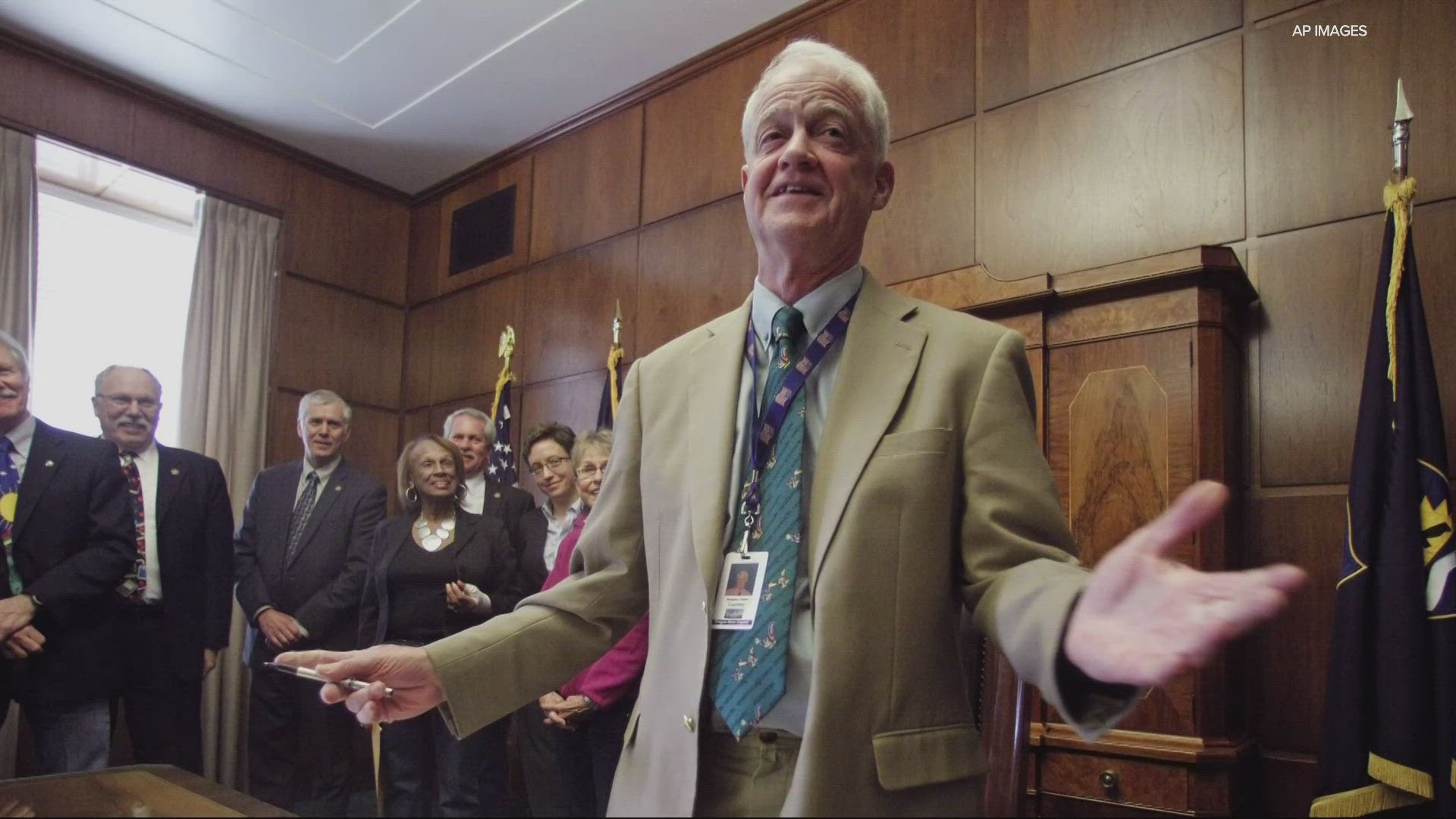SALEM, Ore. — Former Oregon Senate President Peter Courtney, who retired last year as the longest-serving legislator in Oregon history, has died of complications from cancer, Gov. Tina Kotek's office announced Tuesday.
Courtney died Tuesday morning at his home in Salem at the age of 81, surrounded by family, according to Kotek's office. A funeral mass will be held at St. Mary Catholic Church in Mount Angel, according to the news release, although the date was not specified.
"I want to recognize President Courtney for being one of the most important architects of our state in recent memory. At his core, Peter believed that we need to take care of each other, live with compassion for our neighbors, and get big things done, together. These Oregon values will live on in his name," Kotek said in a statement.
Courtney served 14 years in the Oregon House of Representatives and 24 years in the Oregon Senate, including a record 20 years as Senate President, a role he held up until his retirement in January 2023. His reputation for candid and blunt statements made him one of the legislature's most recognizable personalities, and he left behind a towering legacy after playing a central role in shaping Oregon policy for decades.
He was first elected to the Oregon House of Representatives in 1980, after previously serving on the Salem City Council. His initial stint lasted just a few years — he resigned in 1984 to make an ultimately unsuccessful bid for a U.S. House seat — but he returned to the Oregon House in 1989 and remained in Salem for the rest of his career, moving to the Oregon Senate in 1999 and becoming Senate President in 2003.
He endured an increasingly turbulent final few years in the role, shepherding the legislature through unprecedented operational adjustments during the COVID-19 pandemic and fighting to avoid Senate paralysis as the Republican minority began frequently utilizing walkouts as a tactic to stall legislation by preventing votes.
"I've been to hell and back," Courtney said after the 2019 session, in which a Republican walkout threatened to derail a $2 billon education business tax bill. The Republicans eventually returned and allowed the bill to pass, but only when Democrats agreed to abandon bills on gun control and vaccines.
That session also coincided with the release of a report that faulted the legislature and leading Democrats for failing to adequately respond to sexual harassment allegations against then-Sen. Jeff Kruse. Courtney stripped Kruse of his committee assignments and had the door removed from his office to pressure him to resign, but faced criticism for not simply banning Kruse from the building — something Courtney claimed he didn't have the power to do.
Reflecting on the 2021 session two years later, Courtney remarked that modern legislators tend to be less willing to listen to competing ideas and more determined to see their own ideas prevail, even to the point of viewing expertise or a long tenure as a negative.
"I don't know if I'm pessimistic as much as realistic," he said in an interview with KGW. "People don't get along. Compromise is no longer considered valuable."
He stressed the point again when speaking about his pending retirement with KGW's Pat Dooris in 2022. He said the tenor of politics in the legislature had changed, recalling an evening "happy hour" tradition earlier in his career where he and other lawmakers would gather in the fourth-floor offices of former Reps. Bill Markham and Lonnie Roberts to make up at the end of the day, even if the day had included bitter legislative battles.
"Now, Bill Markham was a very, god rest his soul, very conservative Republican. Lonnie Roberts actually was a very conservative Democrat. But they came from different worlds," Courtney said. "And you could go in there, I’m afraid to tell ya — liquor and there was... you know, and it was just raucous. And we had just had a terrible fight in the morning on the House floor on some bill, goin' at it. And here we are — and actually we’d go down and get people, 'Come on, get in here.' And you didn’t even need to ... and just, you’d have two individuals who were really going at it just a few hours before. I mean going at it on the floor or in committee."
Courtney offered a characteristically acerbic answer in that same interview when asked about what he'd do after leaving the legislature, and made it clear that the decision to step away was a bittersweet one.
"I don’t know. I don’t have — I don’t play golf, I don’t have a perfect hobby... that’s another question that you’re asking me. And again, I was sad before I started this interview and now I’m outright depressed thanks to you, Pat Dooris," he said.
"I don’t know," he added. "I have no idea what I’m gonna do. And I, I, I don’t know. I have no magic, beautiful plan. Every plan I ever had in my life never happened. So maybe this is good."

